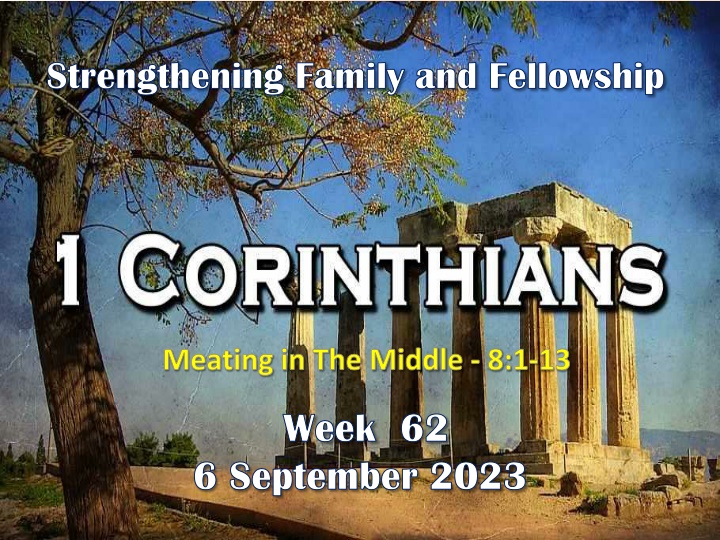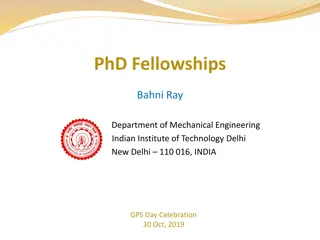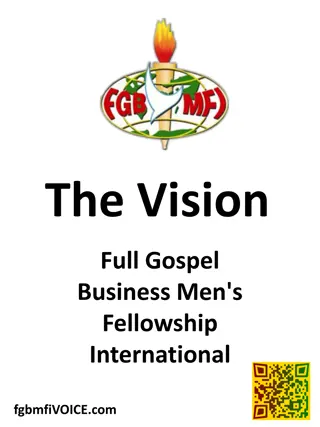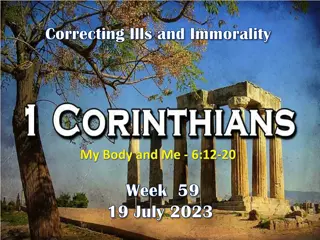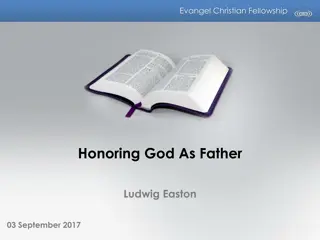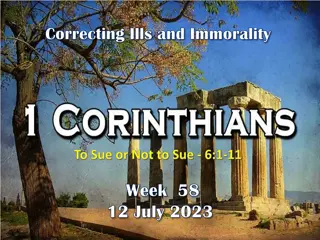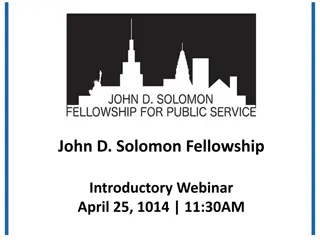Strengthening Family and Fellowship: Christian Conduct in Corinth
Our study in First Corinthians focuses on Christian conduct within the local church, emphasizing unity, discipline, and spiritual growth. The letter addresses issues like meat sacrificed to idols, highlighting the balance between personal freedom and communal harmony. Explore how the teachings of Corinthians guide believers in navigating modern-day dilemmas related to lifestyle choices and adherence to Christian principles.
Download Presentation

Please find below an Image/Link to download the presentation.
The content on the website is provided AS IS for your information and personal use only. It may not be sold, licensed, or shared on other websites without obtaining consent from the author.If you encounter any issues during the download, it is possible that the publisher has removed the file from their server.
You are allowed to download the files provided on this website for personal or commercial use, subject to the condition that they are used lawfully. All files are the property of their respective owners.
The content on the website is provided AS IS for your information and personal use only. It may not be sold, licensed, or shared on other websites without obtaining consent from the author.
E N D
Presentation Transcript
Strengthening Family and Fellowship Strengthening Family and Fellowship Meating in The Middle - 8:1-13 Week Week 62 62 6 September 6 September 2023 2023
1 CORINTHIANS INTRODUCTION As we continue our study in First Corinthians, we are reminded that the theme of this letter revolves around Christian Conduct in the local church and how it influences unity,discipline,andspiritual growth . . . Corinth is Progressive Sanctification the development of Holy character and the application of Christian principles and discipline on an individual and corporate level. So the corrective in this letter is behavior rather than doctrine. Remember, the overarching issue in the church at Family and Fellowship, Paul addresses the specific issue concerning meat sacrificed to idols and Christian freedom, which was causing division and controversy within the Christian community in Corinth. In chapter eight of this fourth section Strengthening
1 CORINTHIANS - LESSON OVERVIEW Our lesson opens with comments about our personal dietary preferences. Swindoll says. . .I never completely understood vegetarians.Yet!Adam, Eve, and others who lived before the flood ate only fruit, vegetables, and grain (Gen. 1:29-30; 9:3). So, I understand if people want to go retro and leave eating meat to me and other carnivores, I m fine with that. But once in a while you may run into a hyper-herbivore, judgmental and legalistic, a fanatic who not only avoids all animal products, but wants to force their personal opinions on everyone they meet. For them, their opinions go beyond avoiding meat for health reasons; they believe it is morally wrong for anyone to eat meat. Period!
1 CORINTHIANS - LESSON OVERVIEW This question about eating meat may seem irrelevant to us today, and those who would judge us for eating meat may be few and far between. What about those who judge us, even now, for drinking champagne at a New Year s Eve party? Or trick-or-treating on Halloween? Or going to a movie, dancing, playing video games, or listening to secular music? These are the kind of things that find their way onto different people s lists of Christian no-nos. The hot issue in the Corinthian church was not whether to go to the movies, play video games, or drink sparkling champagne . . . It was about their new life in Christ!
1 CORINTHIANS - LESSON OVERVIEW Corinth was one of the major centers of idol worship in the ancient world, and as a part of that worship, an animal was brought before a priest to be sacrificed. However, only parts of the animal was burned for the sacrifice usually the legs, fat, and internal organs. The leftovers considered the best pieces of meat were often consumed by those who participant at the festive meal, after the worship service, or taken home, or sold in the public marketplaces. This practice now posed a problem for believers when they were invited guest at a person s home or bought meat in the marketplace, chances were good that some of it came from an animal sacrificed in the worship of a false god.
1 CORINTHIANS - LESSON OVERVIEW Many believed that consuming meat sacrificed to an idol was the same as participating in the worship of that idol. So, the Corinthian believers were worried and fretting about the appropriateness of eating meat that may have been sacrificed to idols. Swindoll says . . . the principle Paul employed to settle this question of Christian Freedom, is just as applicable to the debated practices and gray areas surrounding the list of Christian no-nos of our day as it was to this issue in Corinth.
1 CORINTHIANS 8:1-6 1 Now concerning things offered to idols: We know that we all have knowledge. Knowledge puffs up, but love edifies. 2And if anyone thinks that he knows anything, he knows nothing yet as he ought to know. 3But if anyone loves God, this one is known by Him. 4Therefore concerning the eating of things offered to idols, we know that an idol is nothing in the world, and that there is no other God but one. 5For even if there are so-called gods, whether in heaven or on earth (as there are many gods and many lords), 6yet for us there is one God, the Father, of whom are all things, and we for Him; and one Lord Jesus Christ, through whom are all things, and through whom we live.
1 CORINTHIANS 8:1-6 Here as we start the eighth chapter Paul addresses this new issue on the list of church concerns, the topic of eating meat sacrificed to idols (8:1). This issue presented a dilemma for Christians in Corinth because there were threeknownways a person might end up partaking of the offerings to idols.
1 CORINTHIANS 8:1-6 First Way was for a Christian to actually show up at a pagan temple and eat the fellowship meal in honor of the pagan god. Second Way a Christian might eat meat sacrificed to idols by purchasing the meat in the marketplace for eating at home. Third Way to partake of meat sacrificed to idols was to be invited to a meal at a friend s home that included meat that came for a pagan temple. So, as Paul begins to answer the Corinthians inquiry regarding the appropriateness of eating meat sacrificed to idols, he has to address all three layers of this problem.
1 CORINTHIANS 8:1-6 At the beginning of his written instructions, Paul appeals to the believers liberty in Christ. Previously, Paul had referred to this principle in 6:12, where he writes, All things are lawful for me, but not all things are profitable. The Corinthians knew of their freedom in Christ, but their knowledge had led some to become arrogant rather than loving toward others (8:1). Their pride caused them to abuse their freedom, overstep the bounds of wisdom and holiness, and head back into the mire of careless folly and sin; that had already occurred in the issue of sexual immorality (5:1-2).
1 CORINTHIANS 8:1-6 So, Paul straightens them out by setting up a contrast between arrogant knowledge andedifying love (8:1). Using the word arrogant or physi [foo-see-ah'-o] in Greek, meaning to inflate, to be puffed, or to blow up. Using the word edifies or oikodom [ore-ka-doe- meh'-o] in Greek, meaning to build a house. A good interpretation of this last part of the verse should convey knowledge blows up, but love builds up. Swindoll say . . . that knowledge is a God-given window into reality through which we can view life, but if it is not controlled by edifying love it can become a dangerous weapon that destroys rather that builds.
1 CORINTHIANS 8:1-6 Rather than self-inflating knowledge (8:2), Paul argues for the love of God (8:3), that manifests itself in love for others (8:9). Now, Paul brings this principle to bear on the issue of eating meat sacrificed to idols. All Christians share knowledge of the one true God through their faith in the one Lord, Jesus Christ. Though the foolish pagans may believe that their statues of wood, gold, silver, and stone have some divine powers. Christians know they are merely man-made relics of a depraved religious system (8:4-6).
1 CORINTHIANS 8:1-6 Based on this knowledge, the implication is clear: Since idols are merely human creations, and there is only one true God, eating meat that has been sacrificed to a piece of craved wood or molded silver is really inconsequential. After all, how can meat, in and of itself, be made evil by gods that don t exit? Our Christian worldview should drive out the superstitions that often surround us . . . Such as, fear of bad luck over broken mirrors, walking under ladders, black cats, or certain numbers, should be driven out by the knowledge believers have of the one true God and how his world works.
1 CORINTHIANS 8:1-6 Yet having this knowledge without love for God and one another can lead to all kind of problems. Why? Because, not all believers have a mature understand of these things.
1 CORINTHIANS 8:7-9 7However, there is not in everyone that knowledge; for some, with consciousness of the idol, until now eat it as a thing offered to an idol; and their conscience, being weak, is defiled. 8But food does not commend us to God; for neither if we eat are we the better, nor if we do not eat are we the worse. 9But beware lest somehow this liberty of yours become a stumbling block to those who are weak.
1 CORINTHIANS 8:7-9 Here, Paul notes that not all believers have the same knowledge or understanding as do mature believers (8:7). In other words, some new believers who once were steeped in idolatrous religious cults may take longer to come to grips with a proper view of this new world. Just as it is today there are some believers: Who had been heavily involved in the wild party scene with lots of booze and drugs may balk at Christians who see nothing wrong with meeting friends at a bar or grill. Believers who were saved from a life of sex addiction who might raise their brows at a believer who has no problem going to see certain movies or visiting the beach.
1 CORINTHIANS 8:7-9 Or those who had been involved in eastern mysticism might believe that Christians who burn incense at home are unwittingly conjuring up demons. Knowledgeable Christian, however, know that in and of themselves, these places and thing are harmless. But younger Christians, new in the faith and early in their discipleship, may still associate these things with the wicked practices in which they once participated. That s why Paul appeals not just to the Corinthians knowledge of theology and logic, but to their responsibility to love those, who are saved but untaught and immature. Ignorant of a balanced Christian worldview, they may be easily offended at others exercise of their liberty.
1 CORINTHIANS 8:7-9 These new believers who were accustomed to the pagans theology of the idol that it had in and of itself some real mystical power still bought into the idea that the meat sacrificed to the idol was contaminated by association and therefore spiritually harmful to them (8:7). What these believers don t realize is the meat issue is amoral. Eating meat would not affect their relationship with Christ one way or another (8:8). The one who eats is not harmed; the one who abstains is not blessed. But, because many in Corinth still had a very sensitive conscience toward the issue of meat sacrificed to idols, Paul urged mature believers to exercise love by restraining their liberty when dealing with weaker brothers and sisters in Christ (8:9).
1 CORINTHIANS 8:10-13 10For if anyone sees you who have knowledge eating in an idol s temple, will not the conscience of him who is weak be emboldened to eat those things offered to idols? 11And because of your knowledge shall the weak brother perish, for whom Christ died? 12But when you thus sin against the brethren, and wound their weak conscience, you sin against Christ. 13Therefore, if food makes my brother stumble, I will never again eat meat, lest I make my brother stumble.
1 CORINTHIANS 8:10-13 Here in 8:10, Paul reveals the folly that results from the arrogant application of knowledge. Many who were considered mature in knowledge felt so sure that the meat sacrificed to idols was nothing that they rushed straight into the temples to eat the meat hot of the altars. These bold but insensitive carnal believers had overstepped their liberty, failing to temper their decisions with love and self-control. As a result, they careened headlong into licentiousness and brought a number of immature believers with them. Those immature believers had not yet come to a place where they could say, This is just a piece of meat.
1 CORINTHIANS 8:10-13 For them it was still a means of worshiping false gods, resulting in a violation of their conscience and a corruption of their immature faith (8:11). In Romans 14:14-15, Paul tells us how to wisely and lovingly adjust the application of our knowledge to the spiritual needs of weaker believers. Saying . . . I know and am convinced in the Lord Jesus that nothing is unclean in itself; but to him who thinks anything to be unclean, to him it is unclean. For if because of food your brother is hurt, you are not longer walking according to love. Do not destroy with your food him for whom Christ died. Returning to this issue in 8:12 Paul says, By sinning against the brethren and wounding their conscience when it is weak, you sin against Christ.
1 CORINTHIANS 8:10-13 The heart of the problem is a failure of knowledgeable believers to look out not only for their own interests but also for the interests of others (Phil. 2:4). By indiscreetly flaunting their liberty in Christ to eat any kind of meat they wanted, whenever they pleased, those believers weakened the fellowship of the church. Paul attacks this foolish flaunting of freedom before weaker believers with an extreme solution: If food causes my brother to stumble, I will never eat food again (8:13). Translated in Greek it says, Never, ever unto the age. In other words . . . If enjoying meat meant dragging a brother in Christ back into a lifestyle he had escaped . . . Paul would rather abstain from eating meat forever!
1 CORINTHIANS 8:10-13 Paul isn t talking about tiptoeing around the legalistic scruples of sanctimonious believers who have made Christianity a meticulous system of dos and don ts. Paul takes a strong stand against the religious legalism of self-proclaimed experts in the Law who, for theological reasons, want to drag every Christian under the yoke of Judaism (Gal. 5;1; 1 Tim 1:7). That s not what this is about! Instead, Paul is talking about protecting the tender conscience of weaker believers. In a nutshell, Paul is telling us that Christian love must wisely temper Christian liberty.
APPLICATIONS OF THE LESSON Tempering Liberty with Love
APPLICATION TEMPERING LIBERTY WITH LOVE Swindoll closes with this story . . . You meet a young Christian at church, and you strike up a friendship, and then you realize that your new friend looks up to you for spiritual guidance. Right away you detect your friend has not been discipled, adequately in the faith. There are no discernible signs of mature spiritual knowledge. You are a seasoned marathon runner, your new friend is just getting into a jog. What do you do? Do you slow your pace to help this person that Paul refers to as a weaker brother or do you pass him or her off to someone more at that level?
APPLICATION TEMPERING LIBERTY WITH LOVE Let s assume that your new friend is a recovering alcoholic, saved after a twenty year battle and is now slowly learning to live a life that doesn t revolve around bars and nightclubs. While you come from a family that occasionally enjoys a glass of wine with a nice meal, may serve champagne at a special occasion, or may use alcohol in cooking certain foods. What do you do when your new friend comes over? Do you cook the same recipes and serve the same beverages? Or do you surrender your own freedom in Christ for the sake of your new friend the weaker believer? Or do you just avoid the hassle and not invite your friend into your life?
APPLICATION TEMPERING LIBERTY WITH LOVE These types of situations reveal our real attitudes. Even though today we don t have to battle the issue of eating meat sacrificed to idols. Our world is cluttered with controversial gray areas that can trip up those who are not yet skilled enough to nimbly navigate them. When you encounter these issues, you need to quickly determine the proper priority. Do you exercise your Christian liberty or practice Jesus love? Do you view weaker believers as nuisances or embrace them as those who need to be discipled in the faith?
APPLICATION TEMPERING LIBERTY WITH LOVE Regardless of our differing stance on the grayissues of life, we all have been called to obey one black-and-white command in scripture: Love one another (John 13:34). Here John reminds us that, in every situation, we are to wisely apply love andself-control, not always seeking to live out our own freedom in Christ. But looking for opportunities to show patience and extend grace toward others. That s how we Temper our liberty with love! PatienceandGrace!
NEXT CLASS 13 September 2023 Before next class, read the below chapters in Before next class, read the below chapters in the the NKJV NKJV and in one other versions of the Bible, and in one other versions of the Bible, i.e., i.e., KJV KJV, , NRSV NRSV, , NIV NIV, , CEV CEV, , etc etc Chapter 9:1 27 Sacrificing Rights For Rewards
